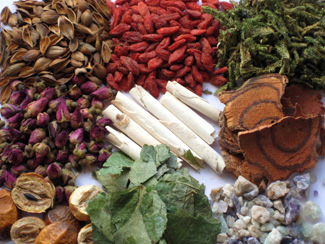
TCM Christchurch has more than 400 different Chinese herbs & remedies.
TCM medical staff will advise and dispense the right combination for each ailment.
TCM can provide prepared brews of cooked herbal combinations.
For more information about Chinese remedies and how they can help you.
Please ask our expert team at our help desk.
Chinese Herbal Medicine:
Medicinal herbs have been used by the Chinese for centuries to cure diseases and to alleviate discomfort due to many different disorders. The first herbal classic written in China was published in the Qin Dynasty (221-206 BC) and can be translated as the Agricultural Emperor’s Materia Medica. The first plants discovered and used were mainly for digestive system disorders, eg. Da Huang, and slowly as more herbs were discovered, herbs became available for an increasing number of ailments and then herbal tonics were created.
Every herb has its own properties which include its energy, its flavour, its movement and its related meridians to which it connects.
The four types of energies are cold, cool, warm and hot. Usually cold or cool herbs will treat fever, thirst, sore throat and general heat diseases. Hot or warm herbs will treat cold sensations in the limbs, cold pain and general cold diseases.
The five flavours of herbs are pungent, sweet, sour, salty and bitter.
- Pungent herbs are generally used to induce perspiration and promote circulation of both blood and Qi. These herbs are usually used for superficial disorders.
- Sweet herbs have three main functions; nourishing deficiency, harmonizing with other herbs, reducing toxicity, relieving pain and slowing the progression of acute diseases.
- Sour herbs also have three functions; to constrict, to obstruct and to solidify. These herbs are good for stopping perspiration, stopping diarrhea, stopping seminal emission and stopping abnormal leucorrhea.
- Salty herbs soften hardness, lubricate intestines and drain downward. These herbs are used to treat hard stools with constipation or hard swellings such as in diseases like goitre.
- Bitter herbs induce bowel movements, reduce fevers and hot sensations, re-direct rebellious Qi, dry dampness and clear heat. They can also nourish the kidneys and are used to treat damp diseases.
After a herb is absorbed in a patient’s body, it can move in four different directions; upward towards the head, downward towards the lower extremities, inward toward the zang-fu organs or outward towards the superficial regions of the body. Herbs with upward movement are used for falling symptoms like prolapsed organs. Downward moving herbs are used to push down up surging symptoms like coughing and vomiting. Outward moving herbs are used to induce perspiration and treat superficial symptoms that are moving towards the interior of the body. Inward movement of herbs induce bowel movements and promote digestion.
Each herb will have a corresponding meridian or meridians. For example, Jie Geng corresponds to the lungs and can be used for asthma or coughs. Rib pain and sore eyes relate to the liver, so since Gou Teng has an affinity for the liver meridian it can be used for the treatment of liver diseases.